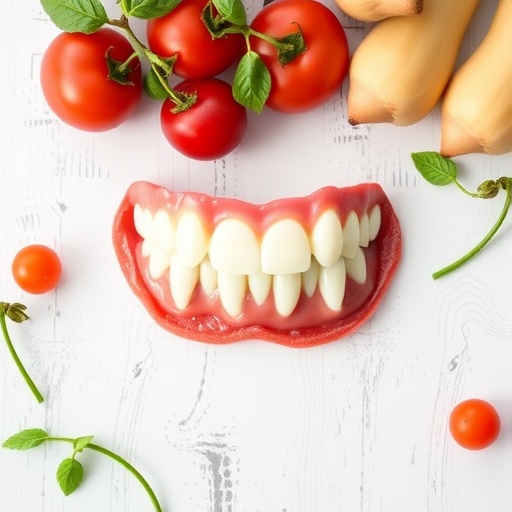Emerging Research Links Mediterranean Diet to Enhanced Gum Health and Reduced Inflammation
A recent study conducted by researchers at King’s College London has uncovered compelling evidence associating adherence to a Mediterranean-style diet with substantially improved periodontal health. This novel investigation highlights the potential of dietary interventions in mitigating the severity of gum disease and systemic inflammation, marking a pivotal advancement in oral health research that could influence future treatment protocols.
The Mediterranean diet, historically celebrated for its robust health benefits, emphasizes consumption of plant-based foods such as legumes, fruits, vegetables, whole grains, and healthy fats predominantly derived from olive oil. This dietary pattern has been extensively documented to confer protection against cardiovascular disease, neurodegenerative conditions, and certain malignancies. Now, its advantageous impact on periodontal tissues adds another dimension to its role in disease prevention.
In this study, 200 hospital patients enrolled in the King’s College London Oral, Dental and Craniofacial Biobank underwent comprehensive dental examinations, blood analyses, and dietary assessments through detailed questionnaires. Researchers observed that individuals whose dietary intake diverged from a Mediterranean pattern, particularly those with frequent red meat consumption, exhibited more pronounced periodontal inflammation and disease severity. This was characterized by heightened levels of circulating pro-inflammatory mediators including Interleukin-6 (IL-6) and C-reactive protein (CRP), biomarkers widely implicated in systemic inflammatory processes.
The mechanistic underpinnings of these findings are intricately linked to the bioactive compounds abundant in Mediterranean foods. Plant-derived phytochemicals, alongside macro- and micronutrients, possess multifaceted anti-inflammatory properties capable of modulating immune responses. By attenuating the production of cytokines such as IL-6 and acute-phase reactants like CRP, these compounds may foster a systemic milieu less conducive to periodontal tissue destruction.
Significantly, patients adhering to plant-based diets characteristic of the Mediterranean regimen demonstrated lower inflammatory marker profiles, suggesting a protective effect against immunological dysregulation that underlies periodontitis. These results underscore the importance of dietary composition, extending beyond caloric intake, in preserving oral health and minimizing chronic inflammatory states.
Dr. Giuseppe Mainas, lead postdoctoral researcher, emphasized the translational impact of these observations, stating that a balanced Mediterranean dietary pattern could serve as a non-pharmacological adjunct to conventional periodontal therapy. He elucidated that their data not only establish a link between dietary habits and gum disease severity but also encourage a holistic consideration of systemic inflammation in periodontal treatment planning.
Professor Luigi Nibali, senior author and Professor of Periodontology, reinforced the significance of nutrient density and plant-rich diets in promoting periodontal wellness. He acknowledged the emergent evidence positioning diet as a modifiable risk factor, advocating for personalized nutritional strategies that could complement traditional clinical interventions aimed at gum disease management.
Periodontal disease, a chronic inflammatory condition affecting the supporting structures of teeth, is primarily induced by microbial plaque accumulation but is heavily influenced by host immune response. This complex pathophysiology involves a dysregulated inflammatory cascade that, if unchecked, leads to tissue destruction and tooth loss. The role of systemic factors such as diet in modulating this immune response has garnered increasing scientific interest.
By systematically analyzing inflammatory biomarkers in conjunction with dietary patterns, the King’s College team bridges a critical knowledge gap. The data suggest that consumption of anti-inflammatory nutrients inherent in the Mediterranean diet can downregulate systemic inflammatory mediators, thereby potentially attenuating local periodontal inflammation and mitigating disease progression.
This research aligns with a growing body of literature highlighting the interconnectedness of systemic health and oral conditions. Chronic inflammation is a recognized contributor not only to periodontal pathology but also to an array of systemic diseases—underscoring the necessity for integrated approaches that incorporate lifestyle modifications alongside clinical treatment.
While the findings illuminate promising directions, the authors acknowledge the need for further longitudinal and interventional studies to establish causality and to optimize personalized nutritional recommendations. They advocate for the incorporation of dietary counseling into dental practice, envisioning a future where personalized dietetics become standard in periodontal care frameworks.
In conclusion, the King’s College London study provides robust evidence positioning the Mediterranean diet as a potential therapeutic ally in the battle against periodontal disease, emphasizing an integrative approach that harnesses the power of nutrition to promote oral and systemic health. As scientific inquiry into diet-inflammation interplay advances, these insights may revolutionize preventive and therapeutic strategies in dentistry and beyond.
Subject of Research: The relationship between Mediterranean-style diet adherence, periodontal disease severity, and systemic inflammation.
Article Title: (Not specified in the source content)
News Publication Date: (Not specified in the source content)
Web References: (Not specified in the source content)
References: Research published in the Journal of Periodontology by King’s College London researchers.
Image Credits: (Not specified in the source content)
Keywords: Diseases and disorders, Health and medicine, Periodontal disease, Mediterranean diet, Inflammation, Interleukin-6, C-reactive protein, Oral health, Nutritional science, Immune modulation, Chronic disease prevention




